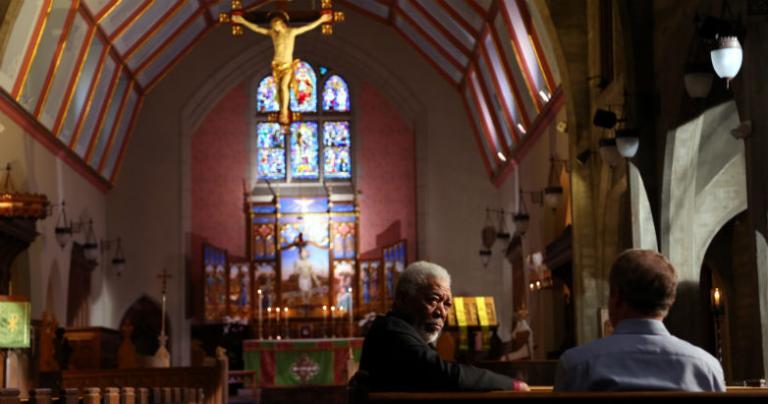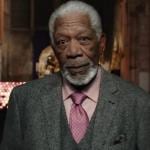
NatGeo Channel’s The Story of God With Morgan Freeman returns after a two-year break on Tuesday, March 5, with a heckuva headliner — the Devil.
The docuseries, which sends host and executive producer Freeman around the world to survey different human conceptions of faith, launches with Search for the Devil. It includes a meeting in Rome with a Catholic priest who does exorcisms and an interview with a man who’s experienced exorcism (pictured above).
During the recent TV Critics Association Press Tour in the Los Angeles area, I sat down, along with some other faith press, for a chat with Freeman, and fellow Revelations Entertainment executive producers Lori McCreary (a Christian, by the way) and James Younger.
I asked if anything scary happened while they were traveling 75,000 miles through 30 countries, and McCreary immediately said, “When we were talking to the exorcist. A lovely gentleman. Morgan was in a great conversation with him. Morgan asked him, ‘How do you know if someone’s possessed, of if there’s just something going on with them mentally?’
“He started describing a few things. One, they speak in languages that are dead languages … But the thing that was chilling to me is, he said, ‘Sometimes I know it’s really real when I think of a question, and the person answers the question I’m thinking. I don’t even verbalize it.'”
Well, OK, then.
I’ve seen the first three episodes of season three, and it’s an improvement over season two, which was a letdown from a pretty solid season one. While Freeman seems to make an emotional connection more with Hinduism and Buddhism, he gives everyone equal respect. And this season, Christianity — especially Catholicism — gets a much fairer shake than it usually does.
One criticism I have of a lot of modern cable documentaries surveying religion is that they include believers talking about other faiths but lean heavily on academics when talking about Christianity. And, whether you know it or not, just because someone is a scholar of Christianity doesn’t mean he or she is a Christian (or even a person of faith at all).
There’s a quite different quality when you’re talking to someone who’s not just knowledgeable about his or her faith but who actually believes it. In this season of The Story of God, I was happy to see a good sprinkling of Christian believers, including Catholic priests. I asked McCreary about this.
“This season especially,” she said, “because we were looking more at individuals’ experiences within their religion, we were erring less on the side of religious scholars and more on the side of people that had the experience, that are believers in whatever faith it is, and the experience that they’re going through. So I think you’ll consistently see that in the rest of our episodes.”
Added Younger, “We want that passion. So, when we do have a scholar, we want to make sure they’re really great, that they’re really dynamic people. Like, say, [scholar and Episcopal priest] Bruce Chilton, when we went into that old house church in Rome — he’s just very passionate.
“Bruce Chilton is a well-known biblical scholar. He’s great, but we don’t want it dry. We’re not trying to learn all the details. We’re not historians really.”
“Bruce is also a Christian,” said McCreary. “So, he’s a scholar and a Christian. They don’t always go together, and it’s a really important distinction.”
Asked what she’d like people to take away from The Story of God, McCreary said, “I would love for someone to walk away having a deeper understanding of their fellow humans and also be more in touch with what their own belief is. That would, for me, be a great outcome — and maybe building bridges to people who think differently from them, because they’ve seen this.”
Younger concurred, saying, “Find something in another faith that they may have written off, or had some stereotypical view of. Then learn something about it and find something in that faith that they find is good.”
Added Freeman, “That’s the bottom line right there. Your belief is as legitimate as mine. I have the deepest respect for it. You and it. I expect the same. You don’t have to change what you think or believe, because there are people who do.
“I don’t think we’re going to succeed in changing the world, or the way the world thinks, but if we could get enough people to understand what we’re not seeing … don’t be afraid, if my faith seems different from yours. We’re not that far apart, I promise you. …
“Maybe I sound a bit jaded about things, and I don’t mean to, but like I say, I’m an open system. What’s there is there. I accept it. Our job, our task, is going around the world and asking people talk to us about their faith. So, you can’t go there and have an attitude about it, you know?”
Episode schedule for The Story of God With Morgan Freeman, which airs Tuesdays at 9 p.m. ET/PT:
Search for the Devil (March 5)
- Who is the devil? A god? A fallen angel? Or a natural urge lurking inside us all? Morgan Freeman’s quest to discover how humankind’s views of evil incarnate affect our world takes him from the Holy Land to Rome to a temple in Vietnam. In his travels, he learns that whether the devil is seen as an antagonist or a natural complement to the forces of good, there is a role for the dark side in almost every faith.
Gods Among Us (March 12)
- Are there people walking among us who truly embody the divine? Many of us were taught that God is in heaven, yet we believe that it’s possible for people on Earth to have a direct connection to God. Christians think of Jesus as the epitome of the divine made human, but people of all faiths have sought God in charismatic figures. Morgan Freeman journeys around the world to explore the mysteries of these mortals, including a rare meeting with the famed Kumari of Nepal, a prepubescent living goddess.
Visions of God (March 19)
- Stories about visions of God are found in most religions, but where do visions come from? What do they have in common? Morgan Freeman sets out to explore the mysteries behind these visions, and his travels take him to Lourdes, France, where believers claim to have been cured of physical and spiritual ills by the water flowing from its spring. He also meets with a member of the Anishinaabe Tribe in Canada to learn about the transformative power of a vision quest.
Deadly Sins
- How do we grapple with the reality that we are all susceptible to sin? What Christians call “sin,” other religions describe with similar concepts, such as “karma” in Buddhism and Hinduism, or “guo” in Taoism. Morgan Freeman travels around the world to explore how different religions have developed ways to fight back against sin. He visits a local Hindu community in the United Kingdom to celebrate Diwali, and journeys to Vietnam, where he meets the commandant of the Hanoi Hilton, the notorious prison where the North Vietnamese kept prisoners such as John McCain during the war.
Diving Secrets (April 2)
- Some faiths keep their entire religious communities hidden for fear of persecution. Other faiths have secret practices that only special initiates are allowed to participate in. Morgan sets out on a journey to understand why secrecy and religion are so often intertwined, and if the mystery of ritual can bring people closer to the mystery of the divine. Along the way, he travels to the spectacularly preserved Villa of Mysteries in Pompeii to see frescoes depicting the secret cult of Dionysus, which is believed to have performed rituals of animal and human sacrifice.
Holy Laws (April 9)
- For many believers, the Ten Commandments are a moral guide and the foundation of Judeo-Christian and Islamic society. Around the world, other societies and religions also have divine prohibitions and prescriptions that the faithful must follow. Morgan Freeman travels to Jerusalem to meet with an archaeologist and examine a segment of the Dead Sea Scrolls, and crosses the globe to Nepal, where he explores the commandments of Jainism — the five great vows or Maha-vastras.
Image: National Geographic/Maria Bohe
Don’t miss a thing: head over to my other home, as Social Media Manager at Family Theater Productions; and check out FTP’s Faith & Family Media Blog, and our YouTube Channel.














